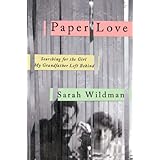 This true story takes us into the life of Valy Scheftel, a young Jewish physician in love with a colleague, Karl Wildman, the author's grandfather. The author became interested in learning about this relationship when, following her grandfather's death, she found a treasure of desperate letters from Valy who was trying to escape Nazi Europe. Karl manages to get out of Vienna with some of his family in 1938, about the time of the Nazi takeover (called the Anschluss). Valy does not want to leave her mother behind, so she plans on joining Karl in the United States with her mother at some future date.
This true story takes us into the life of Valy Scheftel, a young Jewish physician in love with a colleague, Karl Wildman, the author's grandfather. The author became interested in learning about this relationship when, following her grandfather's death, she found a treasure of desperate letters from Valy who was trying to escape Nazi Europe. Karl manages to get out of Vienna with some of his family in 1938, about the time of the Nazi takeover (called the Anschluss). Valy does not want to leave her mother behind, so she plans on joining Karl in the United States with her mother at some future date.No one believed that the Nazi takeover would be so extensive and brutal to the point of genocide. In that world, simply being alive and Jewish was not only challenging but often impossible.
The author has written about her experience researching the tale of this Jewish woman along with the time parallel story of her grandfather starting a new life in America through the series of letters, not only between Valy and Karl but a myriad of others begging for Karl's assistance to escape from the Nazi terror. The author moves to Vienna and travels through Europe researching every possible paper trail. She tries to experience what Karl and Valy may have felt by being in the same places they frequented. The trail of Valy's life leads Sarah to Berlin.
I started this book reluctantly; it was a gift, and of such a serious matter, that I started reading this out of respect for the thoughtfulness of the giver thinking that it would be just another holocaust story to grieve about. I was so wrong. This book was educational, enlightening and changed the way I look at the events of Nazi terror. A major point of this book (there were so many points, I can't even start to list them) is that there were no good endings. To quote the author, "And yet, there are no happy endings to these stories -- indeed, often, and most discomfortingly, there are often no endings at all." In writing of her grandfather, the author says "the past was never past, merely suppressed. There were always secrets, always stories, always rumors". In other words, there were those that were killed and those that left others behind and started new lives. Yet, no one has a happy ending because the past can't be erased.
To say the holocaust was the slaughter of a multitude of people does not do justice to the atrocity. The holocaust was the murder of individuals, each with a story. It was the murder of a future generation that never had the chance to be born. It was an evil that brought out the darkest deeds of man in a time where weapons, communication and transportation had evolved to the point of making it possible to wipe out a people. We can't forget this. Today our weapons and communications abilities are magnitudes more powerful, so our ability to destroy is unspeakably huge. Only our knowledge of this historical period can protect us from repeating history.
My review does not do justice to this book. This book needs to be read to do justice to the story. I would recommend this as a book club read for a group that have the tenacity to face and discuss this great injustice head on. This was also well written and interesting to read.